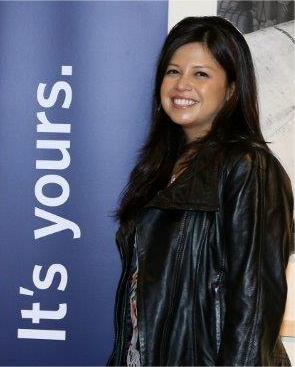December 23, 2015 – The Student Leadership Conference has been highlighting notable UBC alumni who have made an impact on campus and within the UBC community. This interview is part of its most recent series, Alumni Highlights!
Kristen Harvey began her studies at UBC in 1999 and quickly became involved in campus life, first as the Arts Undergraduate Society First Year Representative, then as Totem Park Residence Association President, and AMS VP External, before finally serving as the AMS President from 2002-2003.
Since graduating with a Bachelor of Arts in Political Science, Kristen worked for organizations like the Vancouver 2010 Olympic and Paralympic Winter Games, and FNESC. She returned to UBC in 2013, and now works as Associate Director of Strategic Aboriginal Enrolment Initiatives. Guided by the Aboriginal Strategic Plan, Kristen works with others at UBC to define and remove systemic barriers to Aboriginal student enrolment, and to address the historical under-representation of Aboriginal people in higher education.
Alongside this work, Kristen has served as an alumni mentor for Arts Tri-Mentoring, and as a board member for a not-for-profit organization.
We were fortunate enough to have the chance to ask Kristen about her experiences and how she has leveraged her positions to Make History.
Since arriving at UBC, you made the choice to get involved quickly: working as Totem Park Residence President, AMS VP-external, and eventually AMS President.
What drove you to positions of leadership?
When I first began high school, I felt very intimidated. My plan was to go unnoticed and be invisible. But the plan was disrupted by two teachers who approached me and invited me to consider joining student council. My first thought was that this was a terrible idea, but my parents challenged me to see positives in this opportunity. I became a very reluctant student council representative. I remained involved throughout high school and found mentorship, friendship, and a place where I could contribute ideas and make a difference. I helped shape my school community in a way that felt more inclusive, and this gave me confidence.
By the time I arrived at UBC, I was ready to look for my place to contribute. Eventually I was elected to executive roles with the AMS. I’m proud of the work that helped students feel more connected to their student society – we introduced online voting for student elections and referenda, which significantly increased voter turnout and ultimately brought in a successful vote for the first U-Pass.
You have been a strong advocate for Aboriginal students both during your time as a student and since with your work at UBC. Can you tell us why this is something that you work so hard for, and also your overall hope for Aboriginal students at UBC?
Aboriginal students are underrepresented in higher education. As a staff member of a public institution in a province with more than 200 First Nations communities, I believe we have a responsibility to ensure there are opportunities for Aboriginal students to achieve their educational goals at UBC.
UBC recently signed an agreement with Langara College to solidify a clear educational pathway to UBC for Aboriginal students. As part of the announcement, interim UBC President Dr. Piper shared that “Aboriginal students’ lived experiences enrich UBC’s teaching, research, and learning environment.” I agree. And I hope that First Nations, Métis, and Inuit students find opportunities and success here and in their communities after graduation.
What advice do you have for current students looking to either get involved on campus or make a difference in an area they are passionate about?
UBC is a big place – it can feel overwhelming for emerging student leaders to find ways to get involved. My advice is to consider what is most important to you, find or create an opportunity that helps you achieve what’s important to you, and then just try it out!
For established student leaders, my advice is to consider the ways you can help create leadership opportunities for others. I’ve participated as an alumni mentor in the Faculty of Arts Tri-Mentoring program for several years. Senior students have so much to offer newer UBC students, even in informal settings. Leadership and involvement isn’t only about student government roles.
The theme of the conference this year is Make History, which focuses on building on the accomplishments of the past to create a plan and vision for the future. What does “Make History” mean to you?
When I think of making history, I think of understanding it first. Knowing your family or cultural history can also help you understand your leadership in the context of the generations of people who came before you. For example, my late aunt Sara was the first Indigenous student from her community to graduate from high school and attend college. She was known for her kindness and bright spirit, and she set an incredible example.
And UBC is celebrating its 100th anniversary, which is very exciting. It’s also worth considering the thousands of years that that the Musqueam and Okanagan people have lived on the lands that today form UBC’s two campuses. I encourage student leaders to check out the UBC Centennial Hidden History website as part of your journey to understand and make history as UBC student leaders.
In what way do you hope that you already have, or will, make history?
I am motivated by the idea of positive change and creating opportunities for others. Of course we can’t really know the ways we may make history, but we can ensure we understand our values, have vision and a plan for the future, take action and achieve goals.
Reprinted with permission.

Comments are closed, but trackbacks and pingbacks are open.